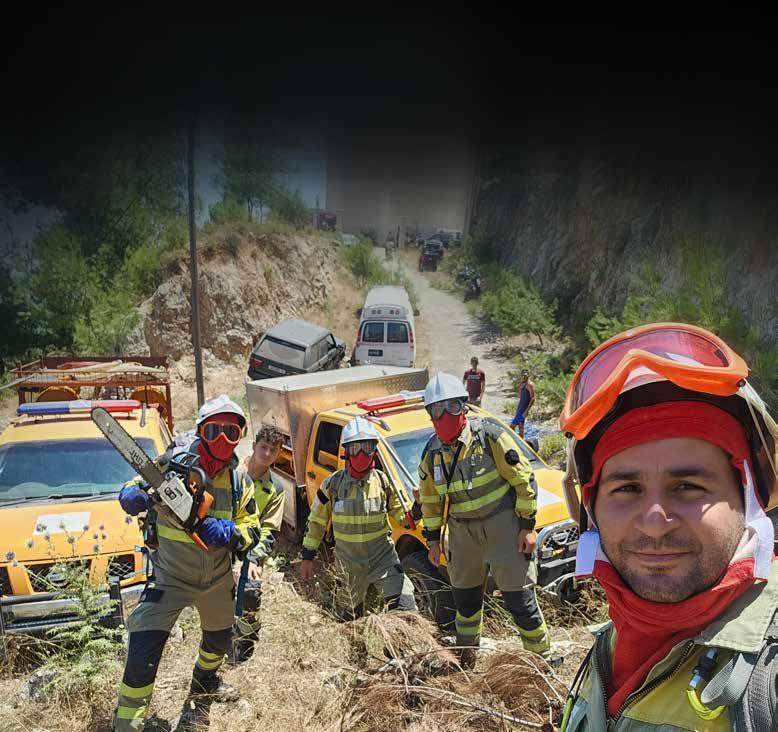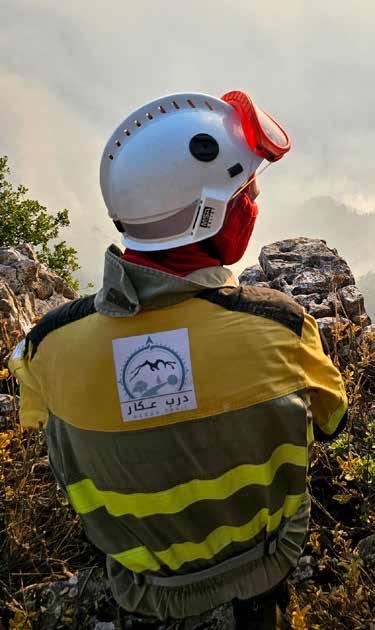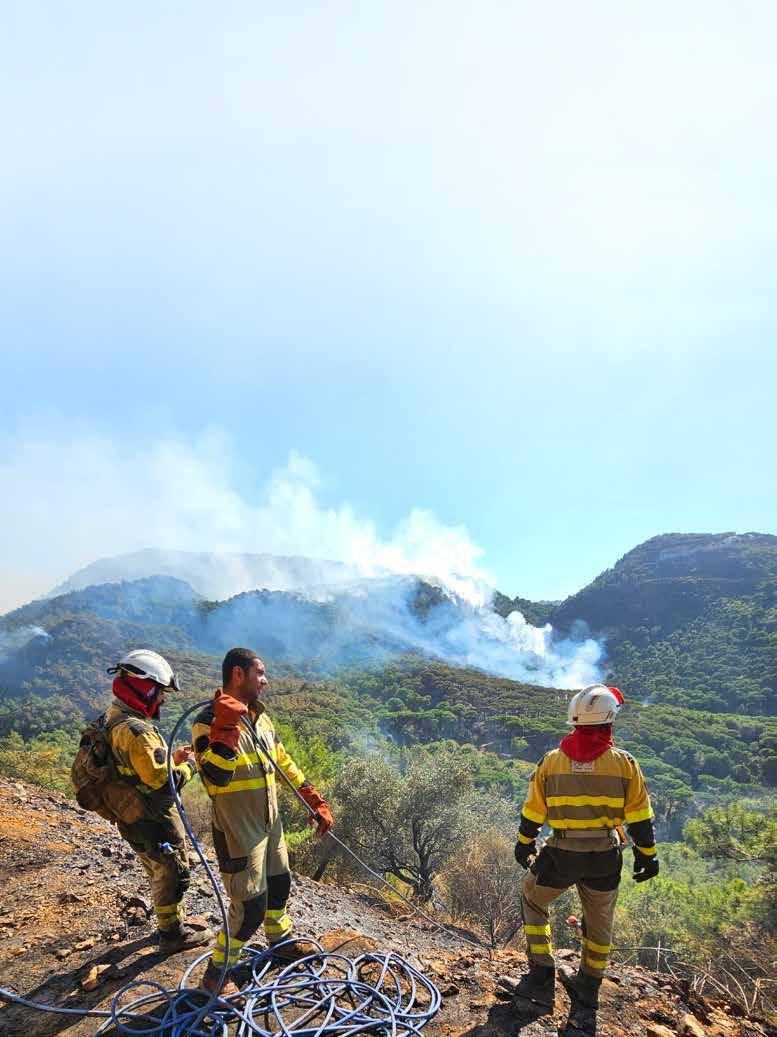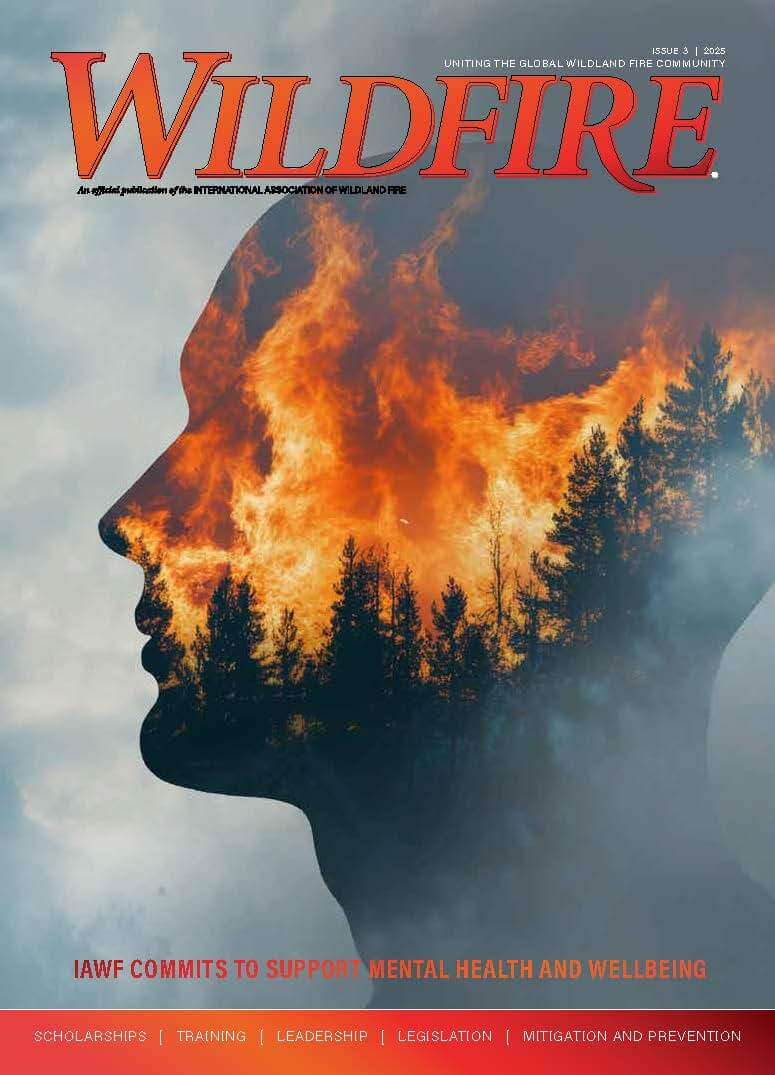BORN OF THE FLAMES: FOUNDING LEBANON’S AKKAR TRAIL FIREFIGHTING TEAM

BY KHALED TALEB
It was a typical Sunday – Aug. 22, 2020. I had just wrapped up a hiking trip and returned home early, expecting a quiet afternoon. But within minutes, the news spread like wildfire: A massive blaze had broken out in Wadi Haql al-Khirbeh, quickly reaching one of the most important cedar forests in our Lebanese village, home also to centuries-old juniper trees.
I rushed to our group chat on WhatsApp and typed: “I’m heading toward the fire. Whoever wants to join me, meet me in front of our association’s center – Akkar Trail.”
Akkar Trail is an environmental non-governmental organization dedicated to ecotourism, mountain trails, and biodiversity documentation.
In just minutes, four volunteers from our mountain guide team assembled, carrying simple tools we usually used for trail maintenance: a pickaxe, a shovel, a pruning saw, and backpacks filled with water and snacks.
We hurried toward the upper reaches of the village. The closer we got, the thicker and darker the smoke became, tinged with a bronze hue. That’s when we realized the extent of the unfolding disaster, reminiscent of the great fire of 2010 that had burned for five days.
Once at the scene, I launched my drone and began documenting and scouting the fire from above. In less than three hours, the fire had consumed about 100 hectares, racing down the slopes from 1,700 meters to 1,000 meters at terrifying speed.
Though we had no prior firefighting training, we decided to act. Using our basic tools, we dug a firebreak and started fighting the blaze; against all odds, we managed to contain a large portion of it. Meanwhile, the only civil defense truck in the area – an old tanker – was unable to access the rugged terrain, limiting its role to offloading water from afar.
We spent two full days battling the flames using agricultural tools, pickup trucks, tractors, and pesticide sprayers. Eventually, we managed to control the fire, but the damage was significant.
The flames had devoured our memories – those ancient trees that had stood by our sides on every hike, silent companions we had carved our names into over the years.
In moments like these, we were reminded of a cherished Lebanese village tradition: Al-Awneh – the collective mobilization of residents to help in times of crisis, rooted in solidarity and communal responsibility.
That spirit gave us the courage to take the next step: the founding of the Akkar Trail Forest Firefighting Team.
We called on friends and supporters to help us raise funds to buy and equip a small, agile firefighting vehicle. To our great surprise, the response was overwhelming – we raised nearly $20,000. With it, we purchased a used Nissan Titan and locally outfitted it with basic equipment. Despite the vehicle’s simplicity, it proved to be remarkably effective in rough terrain. A second vehicle followed the next year.
We named the two trucks Lazzab (after the juniper tree) and Shouh (after the fir tree) – both iconic symbols of Akkar’s forests.
Over the next four fire seasons, our team evolved from a group of amateurs into a respected, professional force. What fueled that transformation? Passion, commitment, continuous learning, adoption of international good practices, modern technology, and a rigorous process of reviewing and learning from past mistakes through annual reports.

With an annual budget of just $15,000, we’ve carried out more than 220 firefighting missions – both in Akkar and beyond – responding to every call for help.
During mid-2025, the Akkar Trail team headed to Syria amidst an unprecedented environmental disaster to assist in fighting devastating wildfires that ravaged thousands of hectares of forests and farmland. Despite limited resources and the setback of the main response vehicles out of service, the team chose to intervene out of a deep sense of humanitarian, environmental, and fraternal duty. What seemed at first like a symbolic gesture turned into a pivotal experience filled with valuable lessons, from gaining field expertise in tackling massive fires, to learning about aerial monitoring technologies, strengthening regional cooperation, and testing readiness under harsh, real-life conditions. This experience proved that learning from others and sharing the field with them is a necessity, not a luxury, and that true solidarity knows no borders. In addition to our quest for evolving the knowledge and capacity
of our own team, we have also organized training camps and shared our experience with teams from across Lebanon. One of our key events was the annual forest fire training camp, inspired by the Polish Forest Camp attended by one of our members, through the invitation of our dear friend Lindon Pronto, senior fire management expert with the European Forest Institute in Germany, and Wildfire associate editor.
During our training camps, we met firefighting teams from all over Lebanon, including from the south. Among them were members of the Risala Scouts Association, brave responders who had paid a heavy price during the most recent Israeli aggression on Lebanon. Their ambulances were deliberately targeted – even though they were clearly marked – resulting in dozens of casualties. These were brothers who had broken bread with us, laughed with us, trained beside us – and are sadly no longer with us.
The Israeli assault has been relentless, and has been an additional driver of wildfires in the region. White phosphorus was used against civilians and forested lands, as confirmed by hundreds of photos and videos. Even after the ceasefire, Israeli drones claimed more lives – one of them a dear friend from the Lebanese Civil Defense, a passionate environmentalist who had repeatedly risked his life to fight wildfires alongside us. He belonged to no political party – just a public servant, targeted nonetheless, while doing what he did best – helping others.

Yet despite all this, our faith remains unwavering. We know we are on the right path – working to protect the forests and rich biodiversity of our region. More than that, we believe in the power of sharing this experience across Lebanon and even abroad, alongside loyal friends and partners.
We have done so much – on less than $80,000 in five years – including the purchase of vehicles, equipment, operations, and maintenance. These numbers tell a powerful story: when even limited resources are used wisely, incredible things are possible. It is no secret that there have been many development aid projects in Lebanon, including projects for capacity development for fire fighting. While a small handful of efforts have proven effective, many have wasted money on poorly planned activities and in our view have misplaced resources. We are therefore very proud to have set such a positive example and affected change in our communities even with the very limited resources at our disposal.
So here’s our call to the global wildfire community:
Support those who’ve proven their worth.
Support those who stood their ground when everything (literally and figuratively) burned around them.
Our team’s vehicles are aging and need replacement.
New volunteers must be recruited and trained. We need stable funding to keep going.
Yet no matter the challenges, we will stand firm.
We will fight to protect what matters.
And we will always live by our motto: “We Extinguish to Protect!”
At a painful moment, we bid farewell to our dear comrade Mahmoud Sultan, the team’s maintenance lead, who tragically passed away in a traffic accident. Mahmoud was the heart of the team, known for his generosity, quiet strength, and reassuring smile even in the most intense situations. He was always present when it mattered most — rushing to repair equipment under fire and smoke so the mission could go on safely. He helped displaced families during war, built hiking trails in the mountains, and protected the land and its people with unwavering dedication. His spirit, kindness, and laughter left a mark on everyone he met. Mahmoud’s passing is a deep loss, but his memory will live on in every trail walked, every tree saved, and every challenge overcome by the team drawing strength from his legacy. May he rest in peace, and may his loved ones find comfort. His spirit will continue to guide our path.
 Khaled Taleb is founder and leader of the Akkar Trail Forest Firefighting Team and has worked as a consultant for various UN-funded projects in Lebanon. Taleb is also an environmental representative appointed by the governor of Akkar, a trail guide, an internationally award-winning photographer, and expert in Lebanese paleontology and botany. Taleb’s discoveries include the recording of new Cretaceous amber outcrops and the documentation of rare and previously unrecorded plant species in Lebanon. His love and fascination for the rich biodiversity of Lebanon is what motivated him to establish Akkar’s firefighting team dedicated to protecting nature through forest fire response and sustainable conservation.
Khaled Taleb is founder and leader of the Akkar Trail Forest Firefighting Team and has worked as a consultant for various UN-funded projects in Lebanon. Taleb is also an environmental representative appointed by the governor of Akkar, a trail guide, an internationally award-winning photographer, and expert in Lebanese paleontology and botany. Taleb’s discoveries include the recording of new Cretaceous amber outcrops and the documentation of rare and previously unrecorded plant species in Lebanon. His love and fascination for the rich biodiversity of Lebanon is what motivated him to establish Akkar’s firefighting team dedicated to protecting nature through forest fire response and sustainable conservation.
